Measurement Counter
M305:CELL_CALL_DROPS_FORCE_HO_SD
M345:CELL_CALL_DROPS_FORCE_HO_TCHF_SIG
M315:CELL_CALL_DROPS_FORCE_HO_TCHF_TRAF
M355:CELL_CALL_DROPS_FORCE_HO_TCHH_SIG
M325:CELL_CALL_DROPS_FORCE_HO_TCHH_TRAF
M3614A:CELL_CALL_DROPS_FORCE_HO_SIG_ULCELL
M3314B:CELL_CALL_DROPS_FORCE_HO_TRAF_ULCELL
M3624A:CELL_CALL_DROPS_FORCE_HO_SIG_OLCELL
M3324B:CELL_CALL_DROPS_FORCE_HO_TRAF_OLCELL
Description
After an MS seizes a channel, if the system initiates a forced handover and the handover fails, the BSC may initiate a call release procedure. This measurement provides the number of call drops due to forced handovers on the basis of the channel type (SDCCH, TCHF, or TCHH), the service type (signaling or traffic), and the concentric attribute (overlaid subcell or underlaid subcell).
Unit
Integer number or integer.
Measurement Point
This counter is measured in the following situations:
- The timer expires before the outgoing BSC handover command is received, or the CLEAR REQUEST message is received from the MSC before the timer expires, and the handover cause is OM intervention, MSC triggering, or preemption.
- A call drop occurs during the emergency handover due to PDCH assignment, or the handover due to TRX mutual aid, preemption, or blocking of cells, TRXs, and channels.
The specific counter is measured at A6, as shown in Figure 1, Figure 2, Figure 3, Figure 4, and Figure 5.
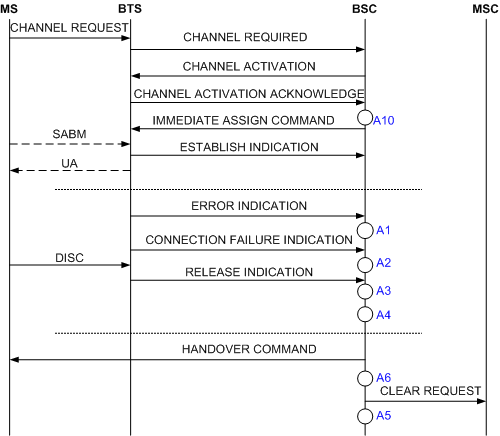
A1: Call Drops Due to ERR IND Received in Stable State, Call Drops Due to the ERR IND Received on the TRX in the Underlaid Subcell in Stable State, Call Drops Due to the ERR IND Received on the TRX in the Overlaid Subcell in Stable State |
A2: Call Drops Due to the CONN FAIL IND Received in Stable State, Call Drops Due to the CONN FAIL IND Received on the TRX in the Underlaid Subcell in Stable State, Call Drops Due to the CONN FAIL IND Received on the TRX in the Overlaid Subcell in Stable State |
A3: Call Drops Due to REL IND Received in Stable State, Call Drops Due to the REL IND Received on the TRX in the Underlaid Subcell in Stable State, Call Drops Due to the REL IND Received on the TRX in the Overlaid Subcell in Stable State |
A4: Call Drops Due to No MRs from MS for a Long Time, Call Drops Due to No MR from the MS on the TRX in the Underlaid Subcell, Call Drops Due to No MR from the MS on the TRX in the Overlaid Subcell, Call Drops due to Abis Terrestrial Link Failure, Call Drops Due to Abis Terrestrial Link Failure on the TRX in the Underlaid Subcell, Call Drops Due to Abis Terrestrial Link Failure on the TRX in the Overlaid Subcell, Call Drops Due to Equipment Failure, Call Drops Due to TRX Failure in the Underlaid Subcell, Call Drops Due to TRX Failure in the Overlaid Subcell, Call Drops due to Resource Check, Call Drops Due to Resource Check on the TRX in the Underlaid Subcell, Call Drops Due to Resource Check on the TRX in the Overlaid Subcell |
A5: Clear Requests Sent on the A Interface |
A6: Call Drops Due to Forced Handover, Call Drops Due to Forced Handover on the TRX in the Underlaid Subcell, Call Drops Due to Forced Handover on the TRX in the Overlaid Subcell |
A10: Successful SDCCH Seizures (Call Type) |
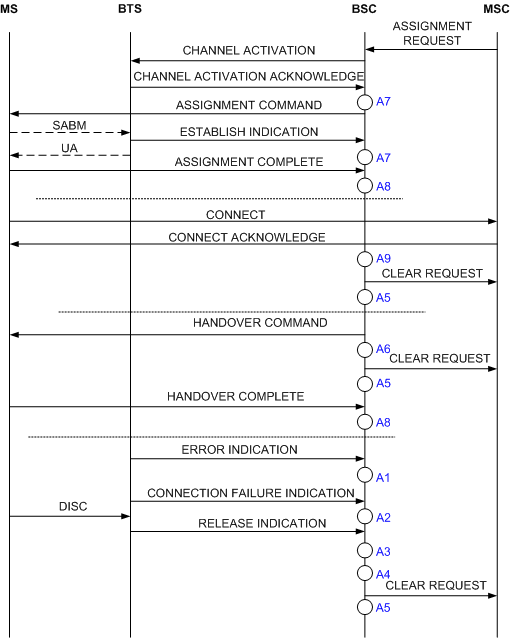
A1: Call Drops Due to ERR IND Received in Stable State, Call Drops Due to the ERR IND Received on the TRX in the Underlaid Subcell in Stable State, Call Drops Due to the ERR IND Received on the TRX in the Overlaid Subcell in Stable State |
A2: Call Drops Due to the CONN FAIL IND Received in Stable State, Call Drops Due to the CONN FAIL IND Received on the TRX in the Underlaid Subcell in Stable State, Call Drops Due to the CONN FAIL IND Received on the TRX in the Overlaid Subcell in Stable State |
A3: Call Drops Due to REL IND Received in Stable State, Call Drops Due to the REL IND Received on the TRX in the Underlaid Subcell in Stable State, Call Drops Due to the REL IND Received on the TRX in the Overlaid Subcell in Stable State |
A4: Call Drops Due to No MRs from MS for a Long Time, Call Drops Due to No MR from the MS on the TRX in the Underlaid Subcell, Call Drops Due to No MR from the MS on the TRX in the Overlaid Subcell, Call Drops due to Abis Terrestrial Link Failure, Call Drops Due to Abis Terrestrial Link Failure on the TRX in the Underlaid Subcell, Call Drops Due to Abis Terrestrial Link Failure on the TRX in the Overlaid Subcell, Call Drops Due to Abis Link Failures in Stable Loopback State, Call Drops Due to Equipment Failure, Call Drops Due to TRX Failure in the Underlaid Subcell, Call Drops Due to TRX Failure in the Overlaid Subcell, Call Drops Due to Resource Check, Call Drops Due to Resource Check on the TRX in the Underlaid Subcell, Call Drops Due to Resource Check on the TRX in the Overlaid Subcell, Call Drops Due to Handover Failure During the Loopback, Call Drops Due to Other Causes in Stable State |
A5: Clear Requests Sent on the A Interface, Call Drops after Answer, Call Drops After Answer on the TRX in the Underlaid Subcell, Call Drops After Answer on the TRX in the Overlaid Subcell |
A6: Call Drops Due to Forced Handover, Call Drops Due to Forced Handover on the TRX in the Underlaid Subcell, Call Drops Due to Forced Handover on the TRX in the Overlaid Subcell, Failed Internal Intra-Cell Handovers (Timer Expired) |
A7: Call Drops Due to Loopback Start Failure |
A8: Successful TCH Seizures on the TRX in the Underlaid Subcell, Successful TCH Seizures on the TRX in the OverLaid Subcell, Call Drops Due to Failures to Return to Normal Call from Loopback |
A9: Successful Connections |
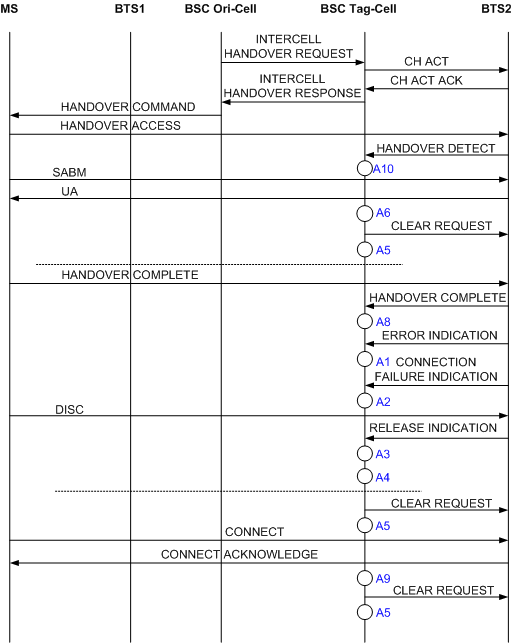
A1: Call Drops Due to ERR IND Received in Stable State, Call Drops Due to the ERR IND Received on the TRX in the Underlaid Subcell in Stable State, Call Drops Due to the ERR IND Received on the TRX in the Overlaid Subcell in Stable State |
A2: Call Drops Due to the CONN FAIL IND Received in Stable State, Call Drops Due to the CONN FAIL IND Received on the TRX in the Underlaid Subcell in Stable State, Call Drops Due to the CONN FAIL IND Received on the TRX in the Overlaid Subcell in Stable State |
A3: Call Drops Due to REL IND Received in Stable State, Call Drops Due to the REL IND Received on the TRX in the Underlaid Subcell in Stable State, Call Drops Due to the REL IND Received on the TRX in the Overlaid Subcell in Stable State |
A4: Call Drops Due to No MRs from MS for a Long Time, Call Drops Due to No MR from the MS on the TRX in the Underlaid Subcell, Call Drops Due to No MR from the MS on the TRX in the Overlaid Subcell, Call Drops due to Abis Terrestrial Link Failure, Call Drops Due to Abis Terrestrial Link Failure on the TRX in the Underlaid Subcell, Call Drops Due to Abis Terrestrial Link Failure on the TRX in the Overlaid Subcell, Call Drops Due to Abis Link Failures in Stable Loopback State, Call Drops Due to Equipment Failure, Call Drops Due to TRX Failure in the Underlaid Subcell, Call Drops Due to TRX Failure in the Overlaid Subcell, Call Drops Due to Resource Check, Call Drops Due to Resource Check on the TRX in the Underlaid Subcell, Call Drops Due to Resource Check on the TRX in the Overlaid Subcell, Call Drops Due to Other Causes in Stable State |
A5: Clear Requests Sent on the A Interface, Call Drops after Answer, Call Drops After Answer on the TRX in the Underlaid Subcell, Call Drops After Answer on the TRX in the Overlaid Subcell |
A6: Call Drops Due to Forced Handover, Call Drops Due to Forced Handover on the TRX in the Underlaid Subcell, Call Drops Due to Forced Handover on the TRX in the Overlaid Subcell, Failed Internal Intra-Cell Handovers (Timer Expired), Failed Outgoing Internal Inter-Cell Handovers (Timer Expired), Call Drops Due to Handover Failure During the Loopback |
A7: Call Drops due to Failures to Return to Normal Call from Loopback |
A8: Successful TCH Seizures on the TRX in the Underlaid Subcell, Successful TCH Seizures on the TRX in the OverLaid Subcell |
A9: Successful Connections |
A10: Successful SDCCH Seizures (Call Type) |
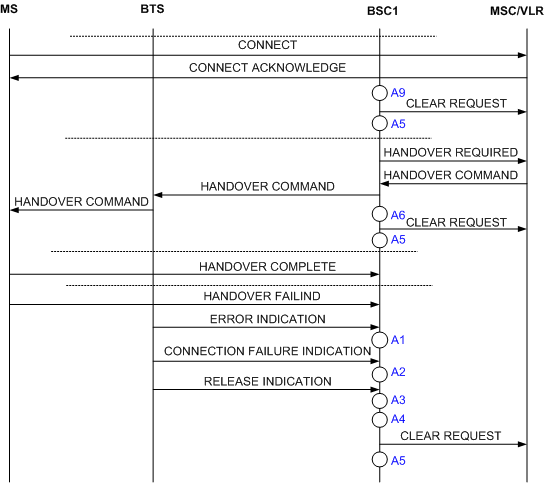
A1: Call Drops Due to ERR IND Received in Stable State, Call Drops Due to the ERR IND Received on the TRX in the Underlaid Subcell in Stable State, Call Drops Due to the ERR IND Received on the TRX in the Overlaid Subcell in Stable State |
A2: Call Drops Due to the CONN FAIL IND Received in Stable State, Call Drops Due to the CONN FAIL IND Received on the TRX in the Underlaid Subcell in Stable State, Call Drops Due to the CONN FAIL IND Received on the TRX in the Overlaid Subcell in Stable State |
A3: Call Drops Due to REL IND Received in Stable State, Call Drops Due to the REL IND Received on the TRX in the Underlaid Subcell in Stable State, Call Drops Due to the REL IND Received on the TRX in the Overlaid Subcell in Stable State |
A4: Call Drops Due to No MRs from MS for a Long Time, Call Drops Due to No MR from the MS on the TRX in the Underlaid Subcell, Call Drops Due to No MR from the MS on the TRX in the Overlaid Subcell, Call Drops due to Abis Terrestrial Link Failure, Call Drops Due to Abis Terrestrial Link Failure on the TRX in the Underlaid Subcell, Call Drops Due to Abis Terrestrial Link Failure on the TRX in the Overlaid Subcell, Call Drops Due to Abis Link Failures in Stable Loopback State, Call Drops Due to Equipment Failure, Call Drops Due to TRX Failure in the Underlaid Subcell, Call Drops Due to TRX Failure in the Overlaid Subcell, Call Drops Due to Resource Check, Call Drops Due to Resource Check on the TRX in the Underlaid Subcell, Call Drops Due to Resource Check on the TRX in the Overlaid Subcell, Call Drops Due to Other Causes in Stable State |
A5: Clear Requests Sent on the A Interface |
A6: Call Drops Due to Forced Handover, Call Drops Due to Forced Handover on the TRX in the Underlaid Subcell, Call Drops Due to Forced Handover on the TRX in the Overlaid Subcell, Failed Outgoing External Inter-Cell Handovers (T8 Expired), Call Drops Due to Handover Failure During the Loopback |
A9: Successful Connections |
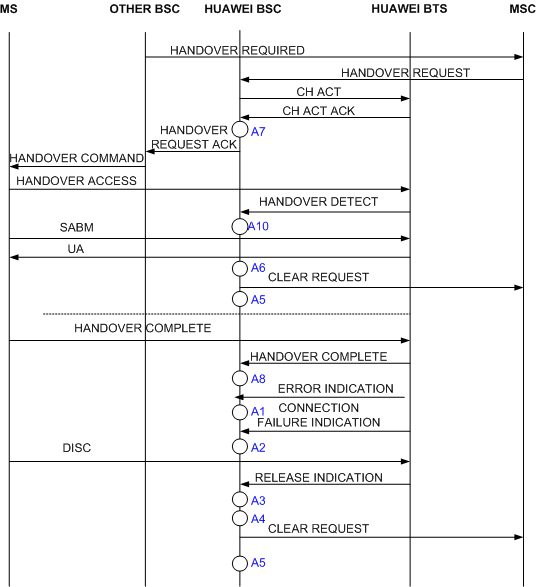
A1: Call Drops Due to ERR IND Received in Stable State, Call Drops Due to the ERR IND Received on the TRX in the Underlaid Subcell in Stable State, Call Drops Due to the ERR IND Received on the TRX in the Overlaid Subcell in Stable State |
A2: Call Drops Due to the CONN FAIL IND Received in Stable State, Call Drops Due to the CONN FAIL IND Received on the TRX in the Underlaid Subcell in Stable State, Call Drops Due to the CONN FAIL IND Received on the TRX in the Overlaid Subcell in Stable State |
A3: Call Drops Due to REL IND Received in Stable State, Call Drops Due to the REL IND Received on the TRX in the Underlaid Subcell in Stable State, Call Drops Due to the REL IND Received on the TRX in the Overlaid Subcell in Stable State |
A4: Call Drops Due to No MRs from MS for a Long Time, Call Drops Due to No MR from the MS on the TRX in the Underlaid Subcell, Call Drops Due to No MR from the MS on the TRX in the Overlaid Subcell, Call Drops due to Abis Terrestrial Link Failure, Call Drops Due to Abis Terrestrial Link Failure on the TRX in the Underlaid Subcell, Call Drops Due to Abis Terrestrial Link Failure on the TRX in the Overlaid Subcell, Call Drops Due to Abis Link Failures in Stable Loopback State, Call Drops Due to Equipment Failure, Call Drops Due to TRX Failure in the Underlaid Subcell, Call Drops Due to TRX Failure in the Overlaid Subcell, Call Drops Due to Resource Check, Call Drops Due to Resource Check on the TRX in the Underlaid Subcell, Call Drops Due to Resource Check on the TRX in the Overlaid Subcell, Call Drops Due to Other Causes in Stable State |
A5: Clear Requests Sent on the A Interface |
A6: Call Drops Due to Forced Handover, Call Drops Due to Forced Handover on the TRX in the Underlaid Subcell, Call Drops Due to Forced Handover on the TRX in the Overlaid Subcell, Failed Incoming External Inter-Cell Handovers (Timer Expired), Call Drops Due to Handover Failure During the Loopback |
A7: Call Drops due to Failures to Return to Normal Call from Loopback |
A8: Successful TCH Seizures on the TRX in the Underlaid Subcell, Successful TCH Seizures on the TRX in the OverLaid Subcell |
A9: Successful Connections |
A10: Successful SDCCH Seizures (Call Type) |
Formula
This is an original counter without involving any formula.